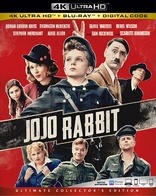Jojo Rabbit 4K Blu-ray Movie
HomeJojo Rabbit 4K Blu-ray Movie 
4K Ultra HD + Blu-ray + Digital Copy20th Century Fox | 2019 | 108 min | Rated PG-13 | Feb 18, 2020
Movie rating
7.8 | / 10 |
Blu-ray rating
| Users | 4.5 | |
| Reviewer | 3.5 | |
| Overall | 3.5 |
Overview
Jojo Rabbit 4K (2019)
A young boy in Hitler's army finds out his mother is hiding a Jewish girl in their home.
Starring: Roman Griffin Davis, Thomasin McKenzie, Scarlett Johansson, Taika Waititi, Sam RockwellDirector: Taika Waititi
| Dark humor | Uncertain |
| War | Uncertain |
| Drama | Uncertain |
Specifications
Video
Video codec: HEVC / H.265
Video resolution: 4K (2160p)
Aspect ratio: 1.85:1
Original aspect ratio: 1.85:1
Audio
English: DTS-HD Master Audio 5.1
French (Canada): Dolby Digital 5.1
Spanish: Dolby Digital 5.1
Subtitles
English SDH, French, Spanish
Discs
Blu-ray Disc
Two-disc set (2 BDs)
Digital copy
4K Ultra HD
Packaging
Slipcover in original pressing
Playback
Region free
Review
Rating summary
| Movie | 3.5 | |
| Video | 4.5 | |
| Audio | 4.5 | |
| Extras | 0.5 | |
| Overall | 3.5 |
Jojo Rabbit 4K Blu-ray Movie Review
Reviewed by Jeffrey Kauffman February 16, 2020Can the scourge of Adolf Hitler and the Nazi party be a source for comedy? That may be a salient question occurring to some viewers as they watch the odd but engaging Jojo Rabbit, and while patently different in both style and content, a film like The Producers might provide a resounding answer of “yes!” to that query in any case. Making fun of Nazis in fact goes back at least to efforts like The Great Dictator and, later, even (to go from the sublime to the patently ridiculous) Hogan's Heroes, but Jojo Rabbit offers a tone that is decidedly different from any of these properties, with an intentionally provocative take on the era which posits a young German boy named Johannes Betzler (Roman Griffin Davis) who is seeing the epochal events play out from his own decidedly skewed perspective. That skewed perspective is in evidence from the get go in this often slightly surreal film, where it turns out that Johannes, who goes by Jojo and is ultimately given the disparaging nickname Jojo Rabbit by some Hitler Youth, has a most unusual imaginary friend — one Adolf Hitler (Taika Waititi, who also adapted the screenplay, winning an Academy Award in the process, and directed).
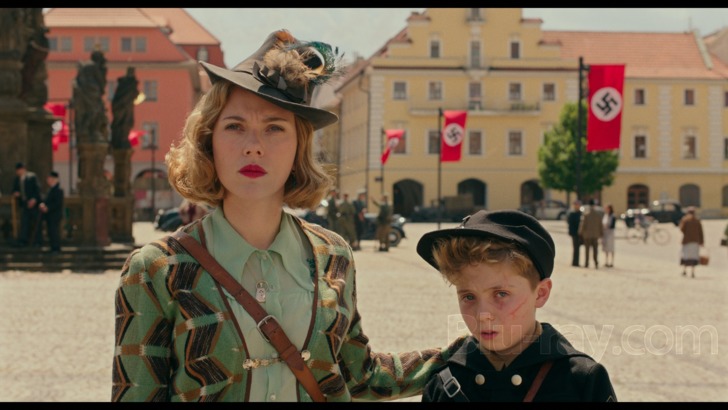
Jojo has just turned ten, and he and Adolf engage in a little team building exercise to help quell Jojo’s fears about joining the Deutsches Jungvolk, part of the Hitler Youth group that started Nazi indoctrination early. Jojo is on the small side, and he’s a bit of a nerd, but Adolf helps him to energize his enthusiasm, and Jojo and his best friend Yorki (Archie Yates) head off for their first Hitler Youth weekend camp. There they are put under the questionable tutelage of Captain Klenzendorf (Sam Rockwell), a hard drinking officer who lost an eye at the front and who nonetheless sees through the Nazi lies being spread by propaganda.
Jojo fails his first "initiation test" when some older Hitler Youth command him to kill a bunny, which Jojo can't bring himself to do (this in turn leads to his unfortunate nickname). After getting a little more esteem building from an often daffy Adolf, Jojo makes the disastrous decision to grab a hand grenade from Klenzendorf in order to prove his bravery, a decision which ends up with Jojo bearing severe facial scars and a rather pronounced limp. Jojo's mother Rosie (Scarlett Johansson, Academy Award nominated for this performance) of course wants to nurture her wounded son, but she also seems to understand Jojo is going to need to learn to fight his own battles, and she, kind of like Adolf in fact, encourages the boy to get out and about. In that regard, she also more or less commands Klenzendorf, who has been demoted due to the accident, to help Jojo fit in with the Hitler Youth and the whole Nazi regime in general.
While kind of doled out almost surreptitiously, information is imparted that Jojo’s long missing father may be a deserter, and adding to the family’s trials and tribulations is the fact that Jojo’s older sister Inge has died. Both of those traumas kind of fade into the subtextual background, though, when Jojo comes home early one day, hears some noise upstairs in his house, and discovers a “secret annex” (to quote The Diary of Anne Frank) behind the wall of Inge’s bedroom, a little cubbyhole which houses a Jewish girl named Elsa (Thomasin McKenzie). Elsa has been granted a reprieve from the Nazis due to Rosie’s kindness, but when Jojo’s initial shock gives way to his supposed “Aryan superiority” and he attempts to take control of the situation, he finds out that Elsa is no withering wallflower.
That is the basic setup of Jojo Rabbit, but the plot, while frequently bracing and often at least wryly amusing if rarely laugh out loud funny (as is perhaps appropriate, given the underlying subject matter), may take a back seat to presentational aspects and the characterizations in the long run. Jojo Rabbit kind of weirdly reminded me of Wes Anderson’s outings, at least in terms of a slightly twee tone and an emphasis on highly stylized performances. There’s also an intentionally off kilter feeling postmodernism at play that introduces elements like a montage of archival footage of actual Nazis doing the “Hitler salute” that plays to the Beatles’ German version of “I Want to Hold Your Hand”. When the film is funny (and it undeniably is, at least in my estimation), it’s often almost scabrously so, as in Elsa’s mental and physical takedown of Jojo, something that almost plays like one of those “alternate universe” outings by Quentin Tarantino.
Buffoonish portrayals of Nazis in general and Hitler in particular are just kind of de rigeur in the three examples I cite above, but what struck me as really interesting about this exploration of the same underlying conceit is how it’s often tinged with an undeniable menace, something that I’d argue is missing in at least two of the three examples I mention (I’d say Chaplin’s film probably comes closest to examining the sort of feeling I’m attempting to describe here, but I don't think even it creates the same bifurcated emotional ambience that Jojo Rabbit does). That really gives Jojo Rabbit some of its most visceral impact, especially when things build to a rather shocking climax.
Note: My colleague Brian Orndorf liked Jojo Rabbit even more than I did. You can read Brian's thoughts here.
Jojo Rabbit 4K Blu-ray Movie, Video Quality 
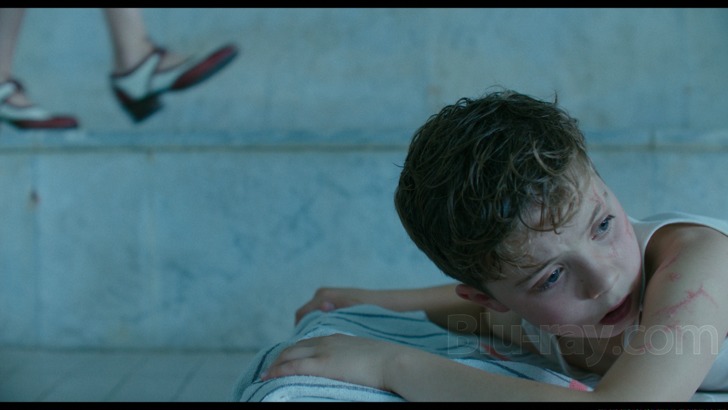
Note: Screenshots are sourced from the 1080p Blu-ray.
Jojo Rabbit is presented in 4K UHD courtesy of 20th Century Fox Home Entertainment with a 2160p transfer in 1.85:1. In our
Jojo Rabbit Blu-ray review, I mention how, while this was
finished at a 2K DI (according to the IMDb), detail levels even in the 1080p Blu-ray version struck me as nearing "real" 4K levels, something I said
reminded me of another recent Fox release, Ford v Ferrari, and there's now another way this film reminds me of the racing opus. As I mentioned in our
Ford v Ferrari 4K Blu-ray review, I was far more
cognizant of the digitally added grain in the 4K version when compared to the 1080p version, and that's once again the case here. To my eyes it's a
much more subtle phenomenon in Jojo Rabbit than it is in Ford v Ferrari , but if you look at the bright skies behind the scene
introducing Klenzendorf, you can see what I'm talking about. That particular anomaly aside, this is another fantastic looking presentation in 4K, one
with noticeable upticks in fine detail from the get go on the close-ups of Jojo's new Hitler Youth uniform, where the little tufts of fabric on the sleeves
or
the brocaid of his necktie are just beautifully rendered. Other fine detail elements like the parade of wallpaper patterns in the background in Jojo's
home environment have increased precision as well, and particularly busy patterns like the herringbone pants seen on one hanging victim look sharp
and well defined. One of the really interesting things that struck me in this presentation was a wider gamut of tones in the red range, so that some
of
the almost wine colored "Nazi reds" I mention in the review of the 1080p version can approach what I'd term more traditional territory here. The
blue
tinged poolhouse scene has an almost powder blue ambience in this version. There is more of an almost desaturated look to what (without posting a
spoiler) I'll call the emotional climax sequence. The one place where this presentation didn't completely wow me was in any uptick in shadow detail,
which I found minimal at best. For
example, in the first scene of Jojo exploring the "secret annex", there's arguably only marginal improvement, if any, and in fact in the shot taken
from
behind him as he crawls forward on his hands and knees, his body is still completely invisible.
Jojo Rabbit 4K Blu-ray Movie, Audio Quality 
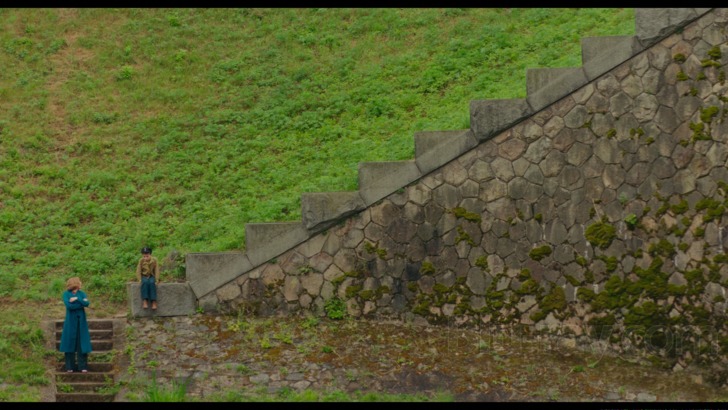
Jojo Rabbit features a DTS-HD Master Audio 5.1 mix that derives quite a bit of energy from its sometimes cheeky use of anachronistic music. Several sequences play out of doors, and some of those feature elements like explosions, and there are very well done immersive effects in those moments. Even some interior moments, like a really weird scene inside a poolhouse where Nazi Youth are being trained for — well, I'm not exactly sure what, there are some appealing surround effects and a really nice recreation of the "echo-y" ambience of the building. Dialogue is rendered cleanly and clearly throughout, and there are no problems of any kind to note.
Jojo Rabbit 4K Blu-ray Movie, Special Features and Extras 
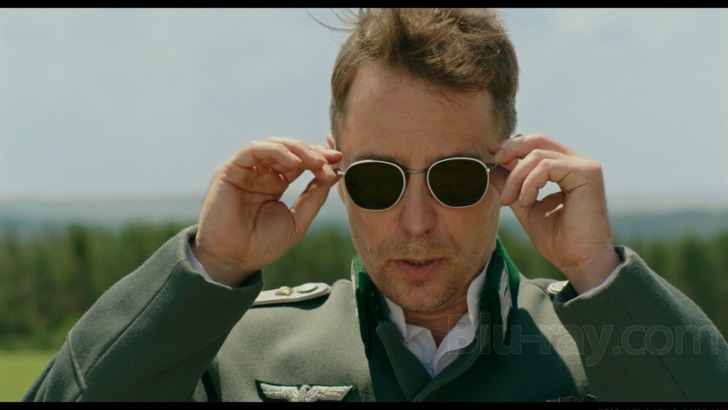
The 4K UHD disc features the Audio Commentary by Taika Waititi. For a list of all the supplements on the 1080p Blu-ray disc also included with this release, please see our Jojo Rabbit Blu-ray review.
Jojo Rabbit 4K Blu-ray Movie, Overall Score and Recommendation 
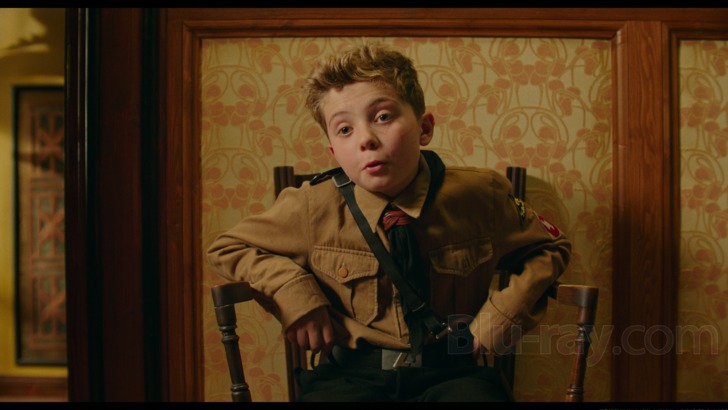
Jojo Rabbit is one of those sui generis offerings that is going to rise and fall for the individual viewer's tolerance for (some might argue surrender to) the film's unabashedly bizarre tonal shifts, not to mention the almost Looney Tunes-esque presentational aspects. I found some of this cartoonish element to wear a little thin after a while, but Jojo Rabbit's undeniable audacity really captivated me, and the film ended up providing a rather hefty emotional wallop. Technical merits are first rate, with the 4K version offering nice upticks in detail and a really nicely nuanced palette, though with the same audio options as on the 1080p Blu-ray, and with only the Commentary on the 4K UHD disc as a supplement. Recommended.
Similar titles
Similar titles you might also like

Four Lions
2010

Dr. Strangelove or: How I Learned to Stop Worrying and Love the Bomb 4K
1964

Inglourious Basterds 4K
2009

The Banshees of Inisherin
2022

Parasite
기생충 / Gisaengchung / Theatrical and B&W versions
2019

World's Greatest Dad
2009

Little Miss Sunshine
2006

The Tin Drum
Die Blechtrommel | Director's Cut
1979

Once Upon a Time in Hollywood 4K
2019

Three Billboards Outside Ebbing, Missouri
2017

Three Kings
1999

American Beauty
1999

Catfight
2016

Birdman
Birdman or (The Unexpected Virtue of Ignorance)
2014

Wrong
2012

Gallipoli
1981

Zola
@Zola
2020

Querelle
1982

Ed Wood
1994

When the Wind Blows
1986
